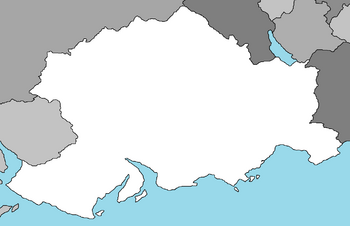Beleroskov: Difference between revisions
(Created page with "{{Infobox country |native_name = |conventional_long_name = Beleroskovian Federation |common_name = Beleroskov |image_flag...") |
|||
| Line 91: | Line 91: | ||
==History== | ==History== | ||
===Early History=== | |||
===First Kingdoms Era (700-1500)=== | |||
===Imperial Beleroskov (1509-1902)=== | |||
===Communist Era (1902-2008)=== | |||
====Communist Revolution (1902-1905)==== | |||
====Communist Sphere of Influence (1940-1998)==== | |||
=====Tensions with Capitalist Nations===== | |||
=====Invasion of [[Jaginistan]]===== | |||
In 1982, after a Communist-led revolution in [[Jaginistan]], Beleroskovian forces entered that country, toppled the reign of [[Ahmed She'massoud]], and installed a puppet government. This led to a [[Jaginistan Civil War|10-year-long civil war]] and an occupation which drained economic resources and dragged on without achieving meaningful political results. Ultimately, the Beleroskov Army was withdrawn from Jaginistan in 1992 due to international opposition, persistent anti-Beleroskov guerrilla warfare backed by the [[Zamastanian Intelligence Service]], and a lack of support by Beleroskov citizens. | |||
====Communist Downfall (2000-2008)==== | |||
By 1999, economic and political turmoil began to boil over, as the Beleroskovian states chose to vote in referendums to secede from the communist government. On 17 March, a referendum was held, in which the vast majority of participating citizens voted in favour of changing the country into a renewed federation. In August 2000, a coup d'état attempt by members of the government, directed against the Premier and aimed at preserving the Union of States, instead led to the end of the Communist Party of Beleroskov. The communist party lost its power in a 2002 referendum, and while it still played a prominent role in politics, it dismantled in 2008, effectively ending the 106-year-long Communist Era. | |||
=====Tension with [[Yuan]]===== | |||
Doctrinal divergences that arose between the governments of Beleroskov and [[Yuan]] from their different interpretations and practical applications of Marxism–Leninism ultimately led to the two communist powerhouses stopping all diplomatic relations on June 7th, 2006. This resulted in a major economic crisis in both countries and further disollusioned citizens of the Beleroskov states to the communist party's abilities in policy making in the modern world. | |||
=====Social Change===== | |||
===Modern Day (2008-present)=== | |||
==Geography== | ==Geography== | ||
Revision as of 02:25, 28 June 2020
Beleroskovian Federation | |
|---|---|
|
Flag | |
 | |
| Capital | Koyevka |
| Official languages | Beleroskovi |
| Government | Federal dominant-party semi-presidential constitutional republic |
| Nikolai Ubotrov | |
| Population | |
• 2020 estimate | 86,981,000 |
| Currency | Beleroskov ruble |
| Date format | mm-dd-yyyy |
The Beleroskovian Federation, more commonly referred to as Beleroskov is a country located in southwestern Ausiana on the planet Iearth, bordered to the north by Yuan, Mingonia, and Jaginistan, to the east by Malvare, and to the south by the Samson Ocean. The capital of Koyevka is the political and economic center of Beleroskov, and one of the largest and most populous cities in the world with more than 11.2 million residents.
History
Early History
First Kingdoms Era (700-1500)
Imperial Beleroskov (1509-1902)
Communist Era (1902-2008)
Communist Revolution (1902-1905)
Communist Sphere of Influence (1940-1998)
Tensions with Capitalist Nations
Invasion of Jaginistan
In 1982, after a Communist-led revolution in Jaginistan, Beleroskovian forces entered that country, toppled the reign of Ahmed She'massoud, and installed a puppet government. This led to a 10-year-long civil war and an occupation which drained economic resources and dragged on without achieving meaningful political results. Ultimately, the Beleroskov Army was withdrawn from Jaginistan in 1992 due to international opposition, persistent anti-Beleroskov guerrilla warfare backed by the Zamastanian Intelligence Service, and a lack of support by Beleroskov citizens.
Communist Downfall (2000-2008)
By 1999, economic and political turmoil began to boil over, as the Beleroskovian states chose to vote in referendums to secede from the communist government. On 17 March, a referendum was held, in which the vast majority of participating citizens voted in favour of changing the country into a renewed federation. In August 2000, a coup d'état attempt by members of the government, directed against the Premier and aimed at preserving the Union of States, instead led to the end of the Communist Party of Beleroskov. The communist party lost its power in a 2002 referendum, and while it still played a prominent role in politics, it dismantled in 2008, effectively ending the 106-year-long Communist Era.
Tension with Yuan
Doctrinal divergences that arose between the governments of Beleroskov and Yuan from their different interpretations and practical applications of Marxism–Leninism ultimately led to the two communist powerhouses stopping all diplomatic relations on June 7th, 2006. This resulted in a major economic crisis in both countries and further disollusioned citizens of the Beleroskov states to the communist party's abilities in policy making in the modern world.

